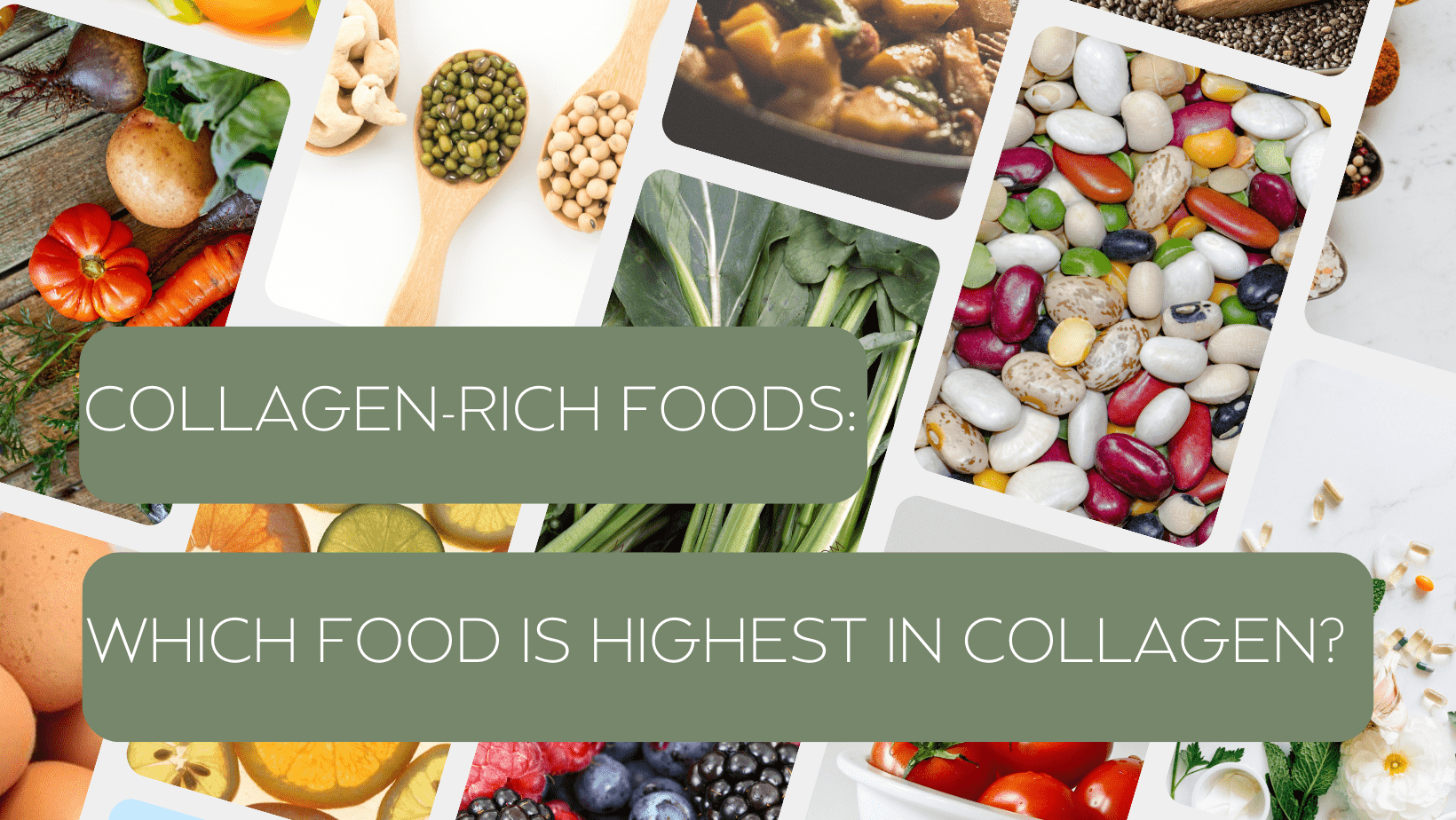Collagen-Rich Foods: Which Food Is Highest In Collagen?
“In food, collagen is naturally found only in animal flesh like meat and fish that contain connective tissue. However, a variety of both animal and plant foods contain materials for collagen production in our own bodies.”
Harvard School of Public Health
There’s lots of information around the use of collagen supplements and the many health benefits that come from keeping our collagen levels up as we age. In the world of health and wellness, supplements that contain collagen have become incredibly popular. Many are upping their collagen intake with creams, powders, and capsules. But did you realize that what you eat can have an effect on your collagen levels too?
Collagen-rich foods do exist! Be sure to keep reading as this guide has lots to teach you about how your diet can support your collagen levels.
Just What is Collagen?

Image Source: Collagen
In order to function, our body produces an essential protein called collagen. Collagen is actually the glue that holds all our cells together. It’s found in all our connective tissues, skin, hair, nails, bones, tendons, ligaments, joints, muscles and even our organs.
Collagen has many roles when it comes to our skin from elasticity, strength, cushioning, structural, regeneration (wound healing) to hydration and more.
Are There Different Types of Collagen?
Yes, there are different types of collagen found in our bodies! And they all play a specific role as they work together to provide our body with the support it needs. The three main types of collagen are:
Type I Collagen
- strongest most abundant
- found in skin, tendons, bones & ligaments
- skeletal collagen
- gives our skin its elasticity
- promotes healing
Type II Collagen
- found in cartilage
- strength and flexibility
- cushions joints
Type III Collagen
- found in all tissues with high elasticity (blood vessels, organs and intestines)
- provides structure support
- Regenerative
Collagen Supplements: Bovine VS Marine

Image Source: Hydrolyzed Collagen—Sources and Applications
When it comes to collagen supplements, there are two main sources: bovine and marine. Both types can be effective in boosting collagen production, but they work in slightly different ways.
Bovine collagen is derived from cow hide and bones. It contains high levels of the amino acids glycine and proline, which are needed for effective collagen production. Peptides are also found in bovine collagen, although somewhat larger than that of marine peptides. Bovine collagen also contains glutamine, which can help to heal the gut lining. Bovine collagen is considered to be the closest match to the collagen naturally produced in the human body.
Marine collagen comes from fish skin and scales. It is rich in the amino acid hydroxyproline, which is essential for collagen synthesis. Marine collagen contains smaller peptides, which is thought to be more easily absorbed by the body. Marine collagen may also contain higher levels of hyaluronic acid, which helps to hydrate the skin.
Ultimately, as long as you are purchasing a top quality supplement, either type will support your overall health.
Which Fruits & Vegetables Are High in Collagen?
Eating a well balanced diet full of collagen-rich foods is one of the most natural ways to boost your collagen production. Diet along with collagen supplementation can do wonders for declining collagen levels and could be your key to healthy, vibrant skin!
So which food is highest in collagen? Let’s take a look at some collagen-rich foods beginning with fruits and vegetables.
Citrus Fruits
Citrus fruits are rich in Vitamin C, which is necessary for the production of collagen. They also contain bioflavonoids, which are antioxidants that help to protect the skin from damage. Bioflavonoids are also thought to promote collagen synthesis.
Some of the best citrus fruits for collagen production include oranges, grapefruits, lemons and limes.
Berries
Berries are not only delicious but they are considered to be collagen-rich foods. This is mainly because berries are rich in antioxidants and vitamins that can help promote collagen production.
Also known to be a good source of ellagic acid, which stimulates collagen production, adding berries to your diet can be very beneficial for keeping our levels of collagen up.
Pineapple
Did you know that pineapples are a collagen-rich food source? That’s right–this delicious, juicy fruit is packed with nutrients that are essential for healthy skin, hair, and nails.
But, what makes pineapple so good for collagen production? Well, it all comes down to the fruit’s unique combination of vitamins, minerals, and antioxidants.
Pineapples also contain bromelain, an enzyme that has been shown to boost collagen production. This along with the fruit’s high antioxidant content helps to protect collagen fibers from damage.
Guava

Image Source: Health Benefits of Guava Fruit and Leaves
Guava is a tropical fruit that is rich in vitamins, minerals, and antioxidants making this delicious fruit an excellent source of collagen.
Guava not only contains high levels of Vitamin C but also other nutrients that are beneficial for the skin, including potassium, magnesium, and manganese.
The many nutrients of guava work together to stimulate collagen while keeping the skin hydrated.
Leafy Greens
Leafy greens are rich in two types of collagen: soluble collagen and insoluble collagen. Soluble collagen helps to keep the skin hydrated and elastic, while insoluble collagen helps to maintain the structure of the skin and prevent wrinkles.
Not only are they known for providing collagen, leafy greens are also a good source of Vitamins A, C, and E, which are all important for our health.
Bell Peppers
Bell peppers are an excellent source of collagen-boosting Vitamins C and A. Vitamin C helps the body’s collagen production, while Vitamin A helps to protect collagen fibers from damage.
Bell peppers are a good source of other nutrients that support skin health, including vitamin E, which helps to protect the skin from sun damage, and carotenoids, which have antioxidant properties.
Mushrooms
Mushrooms are often lauded for their high protein content, but what many people don’t realize is that this makes them an excellent source of collagen.
Mushrooms are a unique source of collagen because they’re able to synthesize it from plant-based material. This means that they can provide a rich source of collagen even for people who don’t eat animal products.
Mushrooms are also a good source of other nutrients like Vitamin D and potassium. They also contain high levels of two key amino acids: glycine and proline. These amino acids are essential for the production of collagen, making mushrooms a valuable food for those looking to improve the health of their skin, hair, and nails.
Beans
There are many foods that are rich in collagen, but beans are a particularly good source. This is because beans contain high levels of the amino acids glycine and proline, which are vital building blocks of collagen.
Beans are a good source of copper, another mineral that is essential for collagen production. Copper helps to activate enzymes that are involved in collagen synthesis, while helping to protect collagen from damage. As a result, eating beans can help to ensure that your body has the raw materials it needs to produce collagen.
What Other Foods Are High in Collagen?
By now you might be wondering if fruits and vegetables are the only sources of collagen-rich foods? Absolutely not! There are other foods to be considered as collagen-rich foods or high in collagen.
For example, foods that are high in protein are considered to be foods highest in collagen. Let’s see what foods fall into this category.
Seafood
Fish and shellfish are good sources of protein, and protein is a key building block of collagen. Seafood is also a good source of Vitamin C and has high levels of zinc. Both of which are important nutrients for collagen production.
Seafood contains omega-3 fatty acids, which have been shown to promote collagen production and protect against collagen breakdown.
Bone Broth

Image Source: Bone Broth
Bone broth has been lauded for its many health benefits, including reducing inflammation, aiding digestion, and helping to rebuild gut lining. One of the key components of bone broth is collagen, giving structure to our skin, hair, nails, bones, and connective tissue.
Bone broth is rich in collagen because it is made by simmering bones and connective tissue in water for an extended period of time. This process breaks down the collagen into smaller collagen peptides that are easily absorbed by the body.
Chicken
Chicken is a good source of collagen because it contains a high level of the amino acid glycine.
Glycine is needed for the production of collagen and other proteins in the body. Chicken also contains other nutrients that are important for collagen production, such as Vitamin C and copper. These nutrients help to improve the quality of collagen in the body.
Eggs
Eggs are one of the most collagen-rich foods you can eat. A single egg contains around 6 grams of protein, half of which is collagen.
In addition to being high in collagen, eggs are also a good source of other nutrients like Vitamin C, selenium, and biotin that are important for skin health.
Should I Add Supplements to My Diet?

Image Source: A Collagen Supplement Improves Skin Hydration, Elasticity, Roughness, and Density: Results of a Randomized, Placebo-Controlled, Blind Study
In an ideal world we would all eat a healthy, well-balanced diet, exercise enough, get 8 hours of uninterrupted sleep every night, and have absolutely no stress in our lives. Unfortunately, no one lives an ideal life.
This is where supplements come in. Taking collagen supplements and trying to eat collagen-rich foods as much as possible is the best way to ensure that your body has enough of the necessary elements to stimulate collagen production as you age.
The Bottom Line
You know that to be your healthiest, your body needs collagen. From the information we have provided in our guide ‘Collagen-Rich Foods: Which Food Is Highest In Collagen?’, you are now able to add collagen-rich foods to your diet to continue to give your body the boost it needs as your natural collagen production begins to decline.
However, for the best possible defense to combat declining collagen synthesis, adding a collagen supplement, rich in collagen peptides to your health and wellness regime is a must.
For reliable health resources and quality supplements, be sure to check out our Health BLOG and collagen product page. Your health deserves the best!
Organixx Clean Sourced Collagens blend contains five types of collagen from four sources. What’s more, it’s combined with targeted nutrients such as zinc, vitamin C, and vitamin B6 which specifically enhance the bioavailability and potency of collagen. Clean Sourced Collagens is formulated from the ground up to enhance and support your body’s natural ability to heal and rebuild itself from the INSIDE out.









Comments